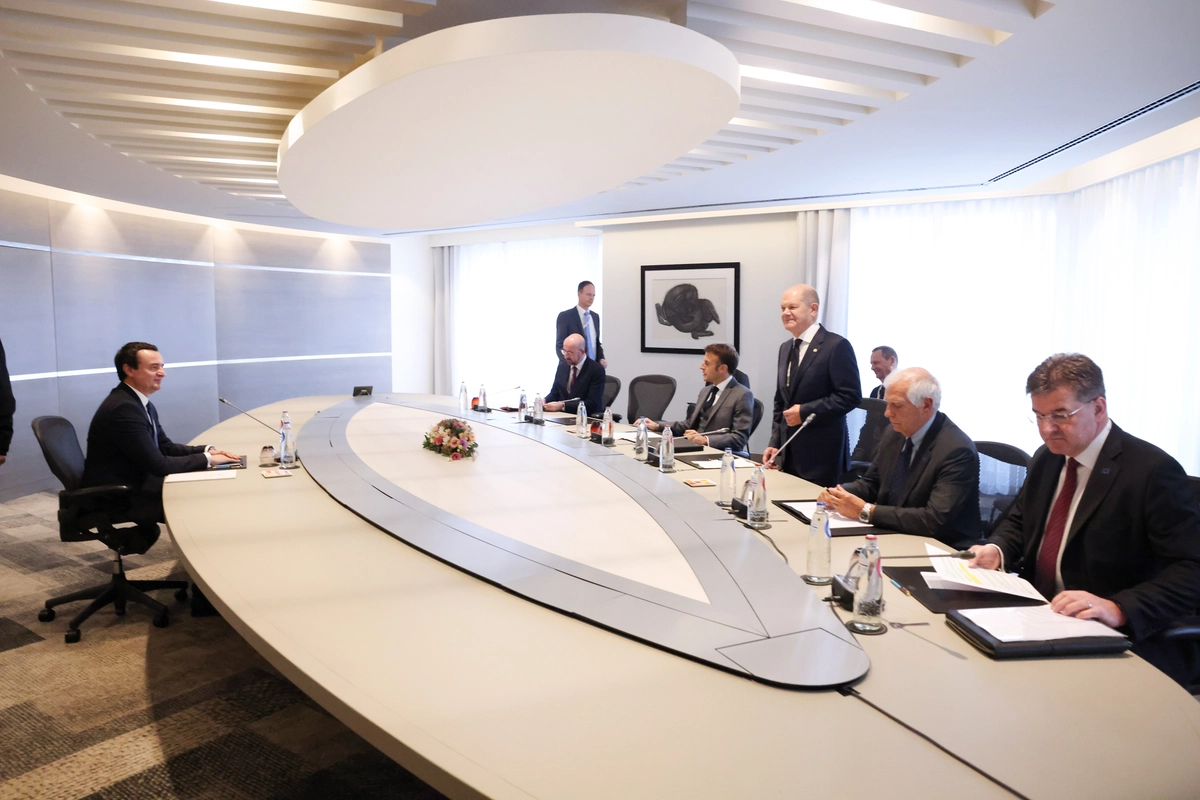An attempt by the leaders of the three largest EU member states, as well as the President of the European Council and the High Representative to make progress in the process of normalization between Kosovo and Serbia failed as they held negotiations in Brussels. According to the EU High Representative for Foreign Policy and Security, Josep Borrell, the reason was conditions put forward by one side, unacceptable to the other. Borrell expressed concern about the impasse in the dialogue. During the day, separate meetings of EU representatives and diplomats were held with Kosovo Prime Minister Kurti and Serbian President Aleksandar Vučić. First, there were meetings with French President Macron, German Chancellor Scholz, Italian Prime Minister Meloni, and European Council President Michel. At these meetings, Kurti and Vučić were conveyed messages from Western leaders that it was time to fulfill all their commitments from previous agreements without delay or preconditions. Then Kurti and Vucic had meetings with the EU representative for dialogue Lajcak and advisors to Scholz, Macron, and Meloni, but as it turned out, those talks brought no concrete result.
Kurti and Vucic had different views of what happened. A press release from the Kosovo prime minister said he accepted the latest proposal tabled by EU and US representatives on October 21, but asked that the proposal, as well as the previous agreement, be signed. In his view, only signature means acceptance, and only signed agreements guarantee their implementation. Prime Minister Kurti said that he is ready to sign the documents in Brussels on February 27, 2023 and in Ohrid on March 18, 2023 and as a result of the negotiations on October 26, 2023, stressing that the current European Council summit in Brussels is an important event and that the venue for the signing of the Framework Agreement, including the draft provided by the European Union and the United States for the implementation of Article 7 in conjunction with Article 10 of the Framework Agreement. Despite Prime Minister Kurti’s proposal, Serbian President Vučić refused to sign the deal with Kosovo and asked to accept the accompanying letter, which practically cancels the three principles of the Basic Agreement, the Implementation Annex, as well as the document proposed by the “Group of Five” on October 21, 2023. In addition, Kurti reiterated during the negotiations that the priority for Kosovo is security, especially on the border with Serbia after the terrorist attack in Banjská and Zvečany on September 24, and sanctions and prosecution should be come against Belgrade so that this never happens again. He recalled that members of the terrorist group, including its leader Milan Radojicic, should be extradited to Kosovo.
President Vučić, in turn, stated that the responsibility for the failure of the negotiations is borne by the Kosovo side. He said that Serbia will not accept Kosovo’s membership in the UN and will not agree to respect the territorial integrity and sovereignty of Kosovo, nor will it recognize Kosovo either de facto or de jure, although the mentioned issues are part of the obligations of previously reached agreements , where, among other things, it is stated that Serbia shall not stand against Kosovo’s membership in any international organization” and that mutual relations will develop on the basis of the principle of equality and respect for the principles of sovereignty and territorial integrity. Meanwhile, Vučić stated that “Serbia, based on its policy, wants to treat all parties as it was signed in 2013, before the agreements in Brussels and Ohrid were inked. Serbia cannot accept either Kosovo’s membership in the UN or Kosovo’s independence.” At the same time, he emphasized that the document that the Group of Five brought to Belgrade on October 21 is a good basis for continuing negotiations in the future, but with reservations regarding Kosovo’s membership in the UN and the recognition of independence and territorial integrity. Belgrade is ready to form the Union of Serbian Municipalities (SMU) in accordance with the proposals received. According to Vučić, during the negotiations held in Brussels, everyone understood that it was not about any signatures, but about the implementation of what had already been signed. He stated that first “the Kosovo side had to fulfill its part”, and Belgrade is ready to deliver on what was signed in parallel. “But I know that they will not fulfill it,”noted Vučić. He reiterated that Serbia wants peace “and that we will either achieve progress, or it will become clear to everyone in Europe who is hindering progress.”
Thus, once again the negotiations on the normalization of Serbian-Kosovo relations, mediated by the EU leadership, the French president, the German chancellor, and the Italian prime minister, saw no real results. The Kosovo prime minister finally understood that it is necessary to adhere more to the recommendations and political proposals put forward by the EU, which is trying to settle the escalation in the north of Kosovo through compromise talks with Belgrade. Perhaps now, Albin Kurti understands more that without the formation of the Community of Serbian Municipalities, he has only a tiny chance of maintaining stability in the area. Meanwhile, during negotiations with European leaders, Kurti tried to squeeze in maximum European support in the issue of prosecuting the perpetrators of the armed provocation on September 24 in Banjska, so that Brussels, Paris, Berlin and Rome supported the idea of imposing sanctions on Serbia or its political leadership, which, he believes, stands behind the deadly incident. In addition, the Kosovo prime minister offered to confirm the agreements in writing, expecting that Vučić would not want to do this, which is exactly what happened. On the other hand, Vučić’s negotiating position has significantly deteriorated. The talks were held against the background of general condemnation of the Banjska incident. In addition, Kurti agreed to the creation of the Community of Serbian Municipalities in the north of Kosovo, so Vučić had to insist on their real formation as a first step, while he, being already partially drawn into the election campaign, changed his position regarding the agreements reached this February in Brussels and in March in Ohrid. It seems that the president seeks to play the Kosovo card in the election campaign and pose before the voters as a determined and uncompromising fighter for Serbia’s interests. This is evidenced by his address to Serbian citizens released immediately after the negotiations in Brussels. And compromise decisions are obviously seen as signs of political weakness in his campaign headquarters.
So the latest negotiations in Brussels yilded no results, but there were still some positive notes for Kurti who finally showed an inclination to greater cooperation with Brussels. The EU leaders could express even more discontent over the Serbian president’s behavior but they do realize that he has actually entered the parliamentary election race ahead of the Dec 17 vote. After the elections are held, Vucic will be less dependent on domestic political commitments. Also, it is possible that the government will change its composition if the opposition wins and then completely different actors will be involved in the negotiation process.



